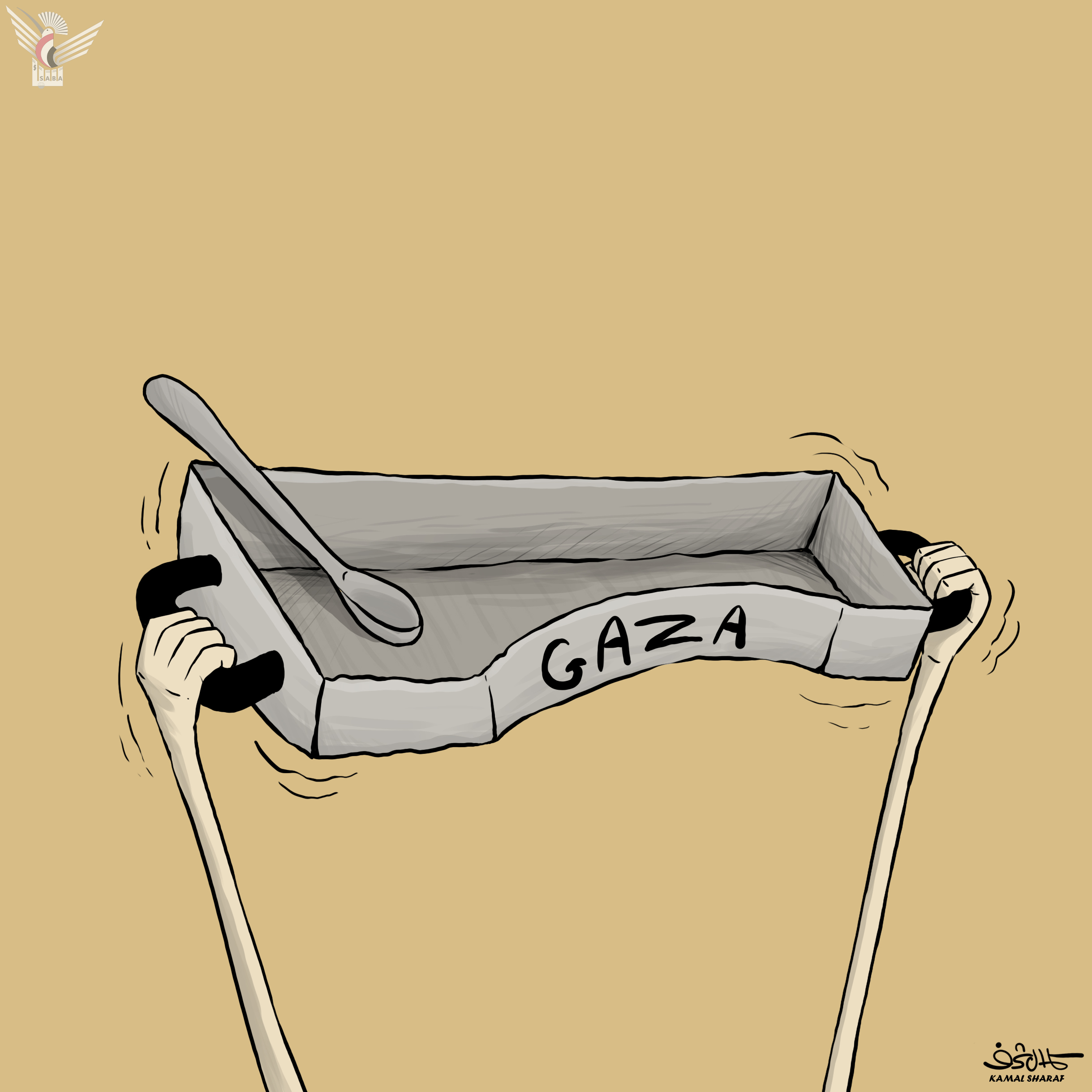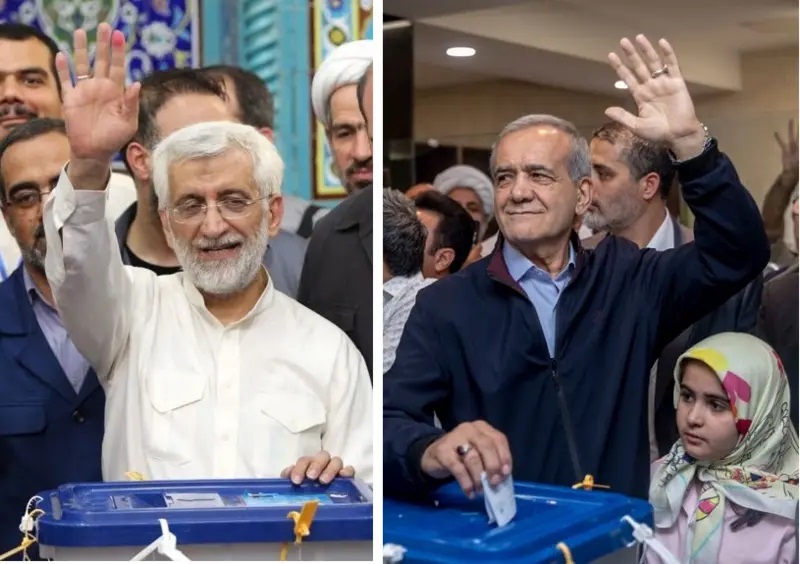SANA'A June 30. 2024 (Saba) - After the reformist Masoud Pezeshkian swept the presidential election race in Iran with more than ten million votes, and his lead over the conservative Saeed Jalili.. It was decided to hold the second round of these elections next Friday, July 5, between these two candidates who led the race.
The initial results of the vote counting operations in the Iranian presidential elections began to appear successively, on Saturday morning, where the reformist Pezeshkian was ahead of the conservative Jalili.
The Iranian Election Commission announced today, Sunday, that a second round will be held between Masoud Pezeshkian and Saeed Jalili.. confirming that the number of participants in the vote reached more than 24 million.
The two candidates are expected to face each other in a second round to be held on July 5, which has only happened once in 2005, since the establishment of the Islamic Republic 45 years ago, when the conservative Mahmoud Ahmadinejad defeated former President Akbar Hashemi Rafsanjani.
Iran's interior ministry said in a statement late last night: "Iran will hold a second round of presidential elections on July 5 with no candidate getting 50 percent of the vote."
A ministry tally showed voter turnout in Iran's presidential election was around 40 percent, the lowest since the 1979 revolution.
The election, which will be held next Friday, is expected to pit reformist candidate Masoud Pezeshkian against conservative former nuclear negotiator Saeed Jalili.
Iranian election spokesman Mohsen Eslami announced the results at a news conference broadcast on state television, saying that of the 24.5 million votes cast, Pezeshkian received 10.4 million, while Jalili received 9.4 million. Parliament Speaker Mohammad Baqer Qalibaf received 3.3 million votes, while Shiite cleric Mostafa Pourmohammadi received more than 206,000 votes.
Iranian law requires the winner to receive more than 50 percent of the total votes cast. If this does not happen, the top two candidates in the race will face a runoff a week later.
This presidential election in Iran is exceptional and early, after the martyrdom of former President Ebrahim Raisi about a month ago, along with his Foreign Minister Abdollahian and senior officials, in a helicopter crash while returning from a joint presidential event with the Azerbaijani president on the border between the two countries.
The conservative Guardian Council had approved six candidates after a thorough examination that excluded many reformists, and one day before the election, two candidates withdrew from the race: conservative Tehran Mayor Alireza Zakani and Raisi’s Vice President Amir Hossein Ghazizadeh Hashemi.
Official media reports said that two members of the Iranian security forces were killed after unknown gunmen attacked a car carrying ballot boxes in Sistan and Baluchestan province.
The previous presidential election saw many reformists and moderates excluded, prompting many voters to stay away. Turnout was just under 49 percent, the lowest in any presidential election in Iran, before reaching a new record high in the current 2024 presidential election.
While observers do not expect the election to lead to a major shift in the policies of the Islamic Republic, the outcome could affect the succession of Ayatollah Ali Khamenei, Iran’s 85-year-old supreme leader who has been in power since 1989.
Mr Khamenei called for a strong turnout, telling state television after casting his ballot: “The strength, power, dignity and reputation of the Islamic Republic depend on popular presence. A high turnout is an absolute necessity.”
Analysts believe that the party that attracts more votes that did not participate in the first round of the election “will have the best chance” of winning.
Iranian political analyst Saeed Shawardi said: "The conservatives gave up on achieving victory, and it can be said that they presented it on a golden platter to the reformists, or at least chose not to decide in the first stage, due to the division and insistence on running in the elections with more than one candidate."
Shawardi added in press statements: "If the conservatives had rallied around one candidate from the beginning, they would have been able to win the elections with ease and achieve more than 50 percent, and this can be confirmed by adding up the votes of Jalili and Qalibaf."
Meanwhile, political analyst Jafar Hashemi said: The second round will make the competition "more intense, not between the competitors as individuals, but between the two currents, which will push the entire reformist current to unify its ranks," referring to the division witnessed in the first round.
He added: "But since the remaining conservative candidate is seen as a threat to the public interests of the people, especially if [former US President Donald] Trump returns to power, this will put the country on the edge of a precipice, which may push the segment that did not participate in the first stage to vote in the second."
Bazeshkian is the oldest candidate (69 years old) for the presidential elections, and the only candidate representing the reformist movement. The surgeon of Azerbaijani origin, born on September 29, 1954, represents the city of Tabriz in parliament.
He also served as Minister of Health under reformist President Mohammad Khatami between August 2001 and August 2005. He is known for his outspokenness. He was excluded from the presidential race in 2021.
Bazeshkian served as Minister of Health and Medical Education in the second reformist government, and had previously supported the protesters against the results of the 2009 elections and also ran for the 2021 elections, but his candidacy was rejected. He was a member of the Iranian Shura Council for five terms and once served as Deputy Speaker of Parliament.
Bazeshkian was also Deputy Minister of Health and Medical Education in Mohammad Khatami’s first government and later replaced Mohammad Farhadi in the second reformist government. Two years after he assumed the position of minister, the Shura Council dismissed Bazeshkian due to appointments, problems with medicines, medical tariffs, and foreign trips.
After two years away from government positions during Mahmoud Ahmadinejad’s presidency, Pezeshkian ran for parliament from Tabriz in 2007 and won the election, winning four terms.
Last year, the Interior Ministry’s executive board initially rejected Pezeshkian’s qualifications for the parliamentary elections, but the Guardian Council later approved them. The executive board had rejected his qualifications on the grounds of “lack of commitment to the Islamic Republic.”
Jalili, 58, is a hardline conservative who opposes rapprochement with Western countries and is one of Supreme Leader Ali Khamenei’s representatives on the Supreme National Security Council.
Jalili previously ran for president in 2013 and again in 2017, but withdrew to support President Ebrahim Raisi, who was killed in a helicopter crash last month.
Jalili registered himself as a candidate for Iran’s early presidential election, and his supporters chanted the slogan “No compromise, no surrender.” This slogan summed up his rigid political views, which were most prominently demonstrated during his tenure as head of Iran’s nuclear negotiations, which resulted in some of the harshest sanctions against the Islamic Republic without reaching a final agreement.
In September 2007, Ahmadinejad appointed Jalili as the new secretary of the Supreme National Security Council, making him the third person to hold the position after Hassan Rouhani and Ali Larijani. At the time, he was the secretary of the Supreme National Security Council and also responsible for Iran’s nuclear negotiations with the West.
Less than a year later, in July 2008, Iran’s supreme leader appointed Jalili as one of his representatives on the Supreme National Security Council, a position he held for 16 years.
Jalili’s constant motto was “turning threats into opportunities,” but many believe that during the six years of nuclear negotiations with the West, he turned opportunities into threats, and ended his term with several UN Security Council resolutions against the Islamic Republic and unprecedented US and European sanctions on Iran.
Jalili ran for president in 2013 as an independent. His six-year record in nuclear negotiations became one of his main weaknesses in the election debates at the time.
According to the Iranian constitution, the Iranian president is elected every four years. These elections were scheduled to be held on June 18, 2025, but the death of the president in a plane crash led to them being held early on June 28, 2024.
The presidency is the second highest position in the country after the Supreme Leader, and all citizens over the age of 18 are eligible to vote. He is responsible for running the day-to-day affairs of the government and has significant influence over domestic policy and foreign affairs, but his powers are considered relatively limited.Especially in matters related to security.
There is an institution called the Election Monitoring Agency, which is run by the Guardian Council, where the institution approves the registration of candidates and selects those who are allowed to run in the elections. The Guardian Council does not publicly announce the reasons for rejecting certain candidates, although these reasons are explained specifically to each candidate, and women are not constitutionally prohibited from running.
It is noteworthy that the applications of at least 30 people who registered their candidacies on May 30 were rejected for not meeting the “basic eligibility requirements.” The Guardian Council rejected the nominations of 74 candidates. Among these, the four women who applied to run for the elections. Former President Mahmoud Ahmadinejad was the most prominent of those excluded, after he was previously excluded in 2021.
Analysts confirm that the current Iranian presidential elections witnessed relatively good participation in the western and southwestern provinces, and that the participation rate improved compared to previous electoral periods. Others saw it as a new chapter and transformation in the course of elections in Iran.
Najat N
resource : Saba

| more of (Reports) |




